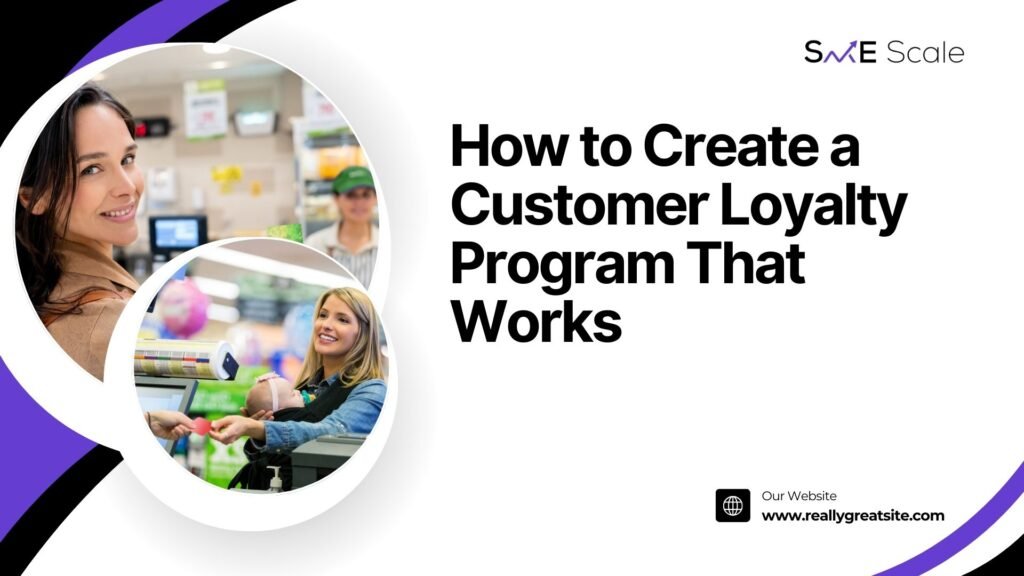How to Create a Customer Loyalty Program That Works: A Case Study Approach

Customer loyalty programs have become an essential part of business strategies for small and medium-sized enterprises (SMEs) aiming to retain their customers and foster long-term relationships. For SMEs, creating a customer loyalty program that works can help drive repeat business, improve customer retention, and increase brand advocacy. In this blog, we will explore how SMEs can build effective customer loyalty programs, supported by a real-life case study, and analyze the psychology behind why such programs succeed.
Why Customer Loyalty Programs Matter for SMEs
Customer loyalty programs offer numerous benefits for SMEs:
Customer Retention: Acquiring new customers can be costly. Loyalty programs incentivize customers to keep coming back, which can improve overall customer lifetime value.
Brand Advocacy: Satisfied, loyal customers often become advocates for your business, recommending your products or services to friends and family.
Increased Sales: Loyalty programs encourage repeat purchases and can even inspire customers to spend more in exchange for rewards or exclusive benefits.
Data Collection: By offering a loyalty program, businesses can collect valuable data on customer preferences, buying behavior, and patterns.
Key Steps to Creating a Customer Loyalty Program
Understand Your Customers:
To design a successful loyalty program, SMEs need to understand their customers’ behaviors and preferences. Do your customers value discounts, early access to products, or exclusive experiences? Tailoring rewards to your audience is the foundation of an effective loyalty program.
Offer Tangible Benefits:
Customers need to feel that the loyalty program provides real value. Offering tangible benefits—such as discounts, free products, or exclusive services—motivates them to participate and remain engaged.
Keep It Simple:
Simplicity is crucial when designing a loyalty program. If the rules and rewards are too complicated, customers may not see the value or will be hesitant to participate. Create a straightforward system where customers can easily earn and redeem rewards.
Personalize the Experience:
Personalization is key to building strong customer relationships. Offering personalized rewards based on customers’ past behavior or preferences makes them feel valued and understood. This approach can increase engagement with the program.
Leverage Digital Tools:
SMEs can use digital platforms to track customer purchases, manage points, and communicate with customers. Digital tools can also automate rewards distribution, making the program seamless and more efficient.
Real-Life Case Study: SME Scale’s Customer Loyalty Success
Background:
SME Scale, a consultancy firm helping SMEs grow, recognized the need to improve customer retention and reward loyal clients. To achieve this, they developed a customer loyalty program tailored specifically for their high-value clients—small business owners who regularly used SME Scale’s AI-powered business automation tools.
The Strategy:
SME Scale launched a points-based loyalty program where clients earned points for every service purchased. Points could be redeemed for discounts on future services, early access to new tools, or personalized consulting sessions. The loyalty program was fully integrated into SME Scale’s website, making it easy for clients to track their points and redeem rewards. They also offered bonus points for clients who referred new businesses to SME Scale, incentivizing referrals and word-of-mouth marketing.
The Results:
The loyalty program was a success:
Increased Customer Retention: SME Scale saw a 25% increase in client retention after the launch of the program. Clients who were previously sporadic in their service purchases began returning more frequently.
Higher Spending: On average, clients enrolled in the loyalty program spent 15% more per transaction compared to those not enrolled.
Referral Growth: The referral program component led to a 20% increase in new client acquisitions, as satisfied customers shared their experiences with other business owners.
The Psychology Behind Loyalty Programs
The effectiveness of customer loyalty programs is based on several key psychological principles:
Reciprocity:
The principle of reciprocity suggests that when businesses offer something of value—like rewards or discounts—customers feel obligated to reciprocate by continuing to do business with them. Loyalty programs tap into this innate human tendency, driving customers to engage with the business in return for benefits.
Endowment Effect:
The endowment effect refers to the tendency for people to place a higher value on things they own or have earned. When customers earn points or rewards through a loyalty program, they perceive those rewards as more valuable, making them more likely to stay loyal to the brand and redeem their benefits.
Status and Exclusivity:
People are often motivated by status and exclusivity. By offering tiered rewards or exclusive benefits to top customers, SMEs can create a sense of prestige around the program. This taps into customers’ desire to achieve higher status, encouraging them to engage more frequently with the brand.
Commitment and Consistency:
When customers start participating in a loyalty program, they are more likely to continue their relationship with the brand. This aligns with the principle of consistency, where individuals strive to act in ways that are consistent with their previous commitments. Once customers start earning points or rewards, they feel committed to continuing their engagement with the program.
Conclusion
Building a successful customer loyalty program is about understanding what motivates your customers and creating a system that rewards them in a way that feels valuable and engaging. By offering tangible rewards, keeping the program simple, and leveraging digital tools to personalize the experience, SMEs can foster deeper connections with their customers, driving long-term loyalty and business growth.
As seen in SME Scale’s case study, a well-designed loyalty program can lead to increased customer retention, higher spending, and organic growth through referrals. By understanding the psychological principles behind loyalty programs and applying best practices, your SME can create a program that not only retains customers but also transforms them into loyal advocates for your brand.

